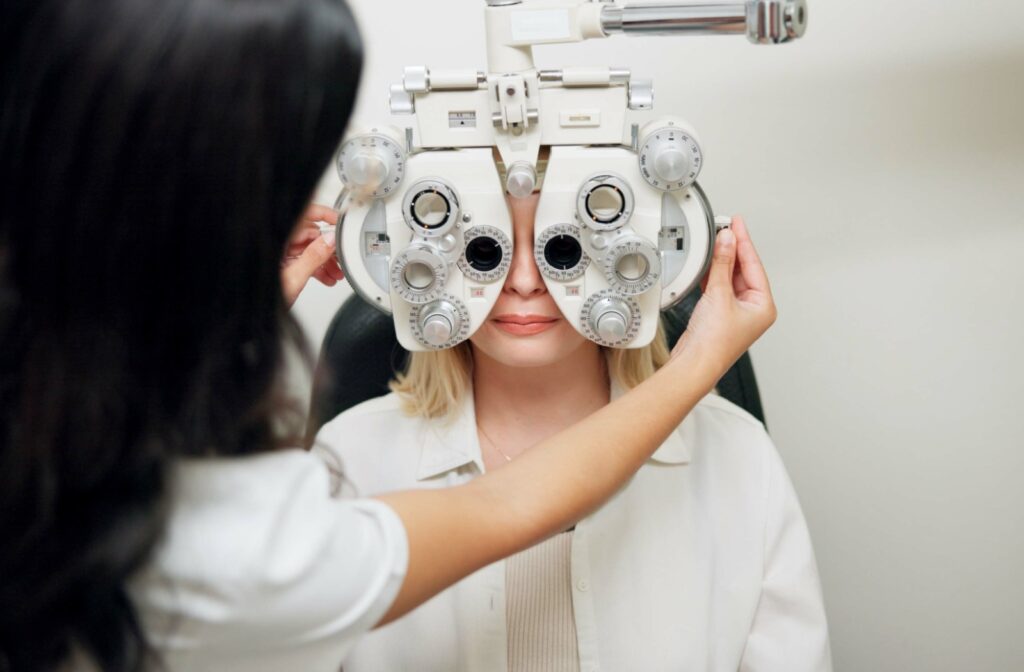Regular comprehensive eye exams are a key part of your health routine. They do more than just check your vision; they offer a look into your overall well-being. Understanding what tests are done during an eye exam can help you appreciate the value of these check-ups.
However, how often you need one depends on a few things, like your age, health, and risk factors for eye conditions. Ultimately, the ideal frequency for your eye exams depends on your age, your health profile, and your optometrist’s recommendation.
A consistent schedule helps protect your sight and can even offer clues about your overall health.
General Guidelines for Eye Exam Frequency
Recommendations for how often you should have your eyes checked vary depending on your age. Here’s a general timeline to help you stay on track with your eye health.
Adults 19 to 64 Years
For adults in this age range with no vision symptoms or underlying risk factors, an eye exam every one to two years is a good schedule. Your optometrist can help you decide what’s right for you based on your occupation, hobbies, and digital device use. If you experience changes in your vision, you should always book an appointment promptly.
Children & Teens
A child’s first eye exam should happen between six and nine months of age. Another check is recommended between the ages of three and five, before they start school. After that, yearly children’s eye exams can help detect and address vision issues that might affect their learning and development.
Adults 65 & Over
Once you are 65 or older, you should plan for an eye exam every year. Regular visits help us monitor for common age-related eye conditions, such as cataracts, and track changes in your vision over time.
Factors That Affect Your Exam Schedule
The general advice above is a start, but your personal needs might be different. Certain factors may mean that you need more frequent check-ups to keep your eyes healthy. Your optometrist will consider your whole health picture when suggesting a schedule.
Your Personal Health History
Health conditions like diabetes or high blood pressure can directly affect your eyes. If you manage a chronic condition, your optometrist may suggest more frequent exams, such as annual diabetic eye exams. These check-ups are an important part of your overall care plan.
If You Wear Glasses or Contacts
People who wear glasses benefit from regular exams to ensure their prescription is current and provides the clearest vision. Contact lens wearers often need yearly appointments, which include a specialized contact lens fitting and exam.

Risks Based on Family History
If conditions like glaucoma or macular degeneration run in your family, you may be at a higher risk of developing them yourself. More frequent exams can help with early detection and management. Discussing your family’s health history gives your eye doctor valuable information.
Why Regular Eye Exams Are Important
An eye exam is about more than just a new prescription. It’s a proactive way to care for your eyes and catch potential issues before they become more serious. Think of it as a comprehensive check-up for your most precious sense.
Look Beyond Just Vision
During an eye exam, your optometrist checks the physical structures of your eye: the retina, optic nerve, and blood vessels. These internal parts of your eye can sometimes show early signs of other health issues in your body. In fact, an eye exam offers a unique window into your overall wellness.
Detect Conditions Like Dry Eye Early
Persistent discomfort, such as a gritty feeling or burning, could be a sign of dry eye. An exam can identify the cause, whether it’s tear quality, blocked glands, or your environment. From there, your optometrist can suggest a simple and effective dry eye treatment plan.
Keep Your Prescription Current
Your vision changes over time, and it’s a gradual process you might not even notice. A regular exam makes sure your glasses or contact prescription is correct. This helps you see clearly and can reduce symptoms like eye strain and headaches.
Signs You Should Book an Eye Exam Sooner
If you notice any changes in your vision or experience discomfort, it’s a good idea to schedule an appointment. You don’t need to wait for your next routine visit. Instead, listen to what your eyes are telling you.
Here is a partial list of symptoms that should motivate a visit to your eye doctor:
- Sudden blurry vision or trouble focusing
- Frequent headaches, especially after screen time
- A gritty or sandy feeling in your eyes
- Redness, burning, or itchy eyes
- Difficulty with night vision
- Seeing flashes of light or new floaters, which may require emergency eye care
What to Expect at Your Appointment
When you visit for an eye exam, our goal is to get a complete picture of your eye health in a comfortable setting. We make sure the process is straightforward and focused on you. It’s a partnership aimed at maintaining your vision and well-being.
A Review of Your Health & Vision
We’ll start by talking about your and your family’s health history, and any concerns you have about your eyes or vision. This helps us understand your specific needs.
A Series of Simple Eye Tests
You’ll go through a series of tests to check different aspects of your sight. This includes reading an eye chart to test your sharpness, checking your peripheral vision, and testing how your eyes work together. To learn more, read our blog about how long an eye exam takes. None of these tests is uncomfortable, and they all provide a wealth of information.
A Chance to Ask Questions
An eye exam is your time to ask anything you want to know. Whether it’s about options for dry eye or ways to reduce digital eye strain, we’re here to provide clear answers. We want you to leave feeling informed and confident about your eye health. Regular eye exams are a simple step you can take for your long-term health and quality of life. At Lowy & Sewell Eye Care, we’re committed to providing comprehensive, compassionate care for you and your family. If it’s time for your next check-up, schedule an appointment with our optometrists in Vaughan today.



